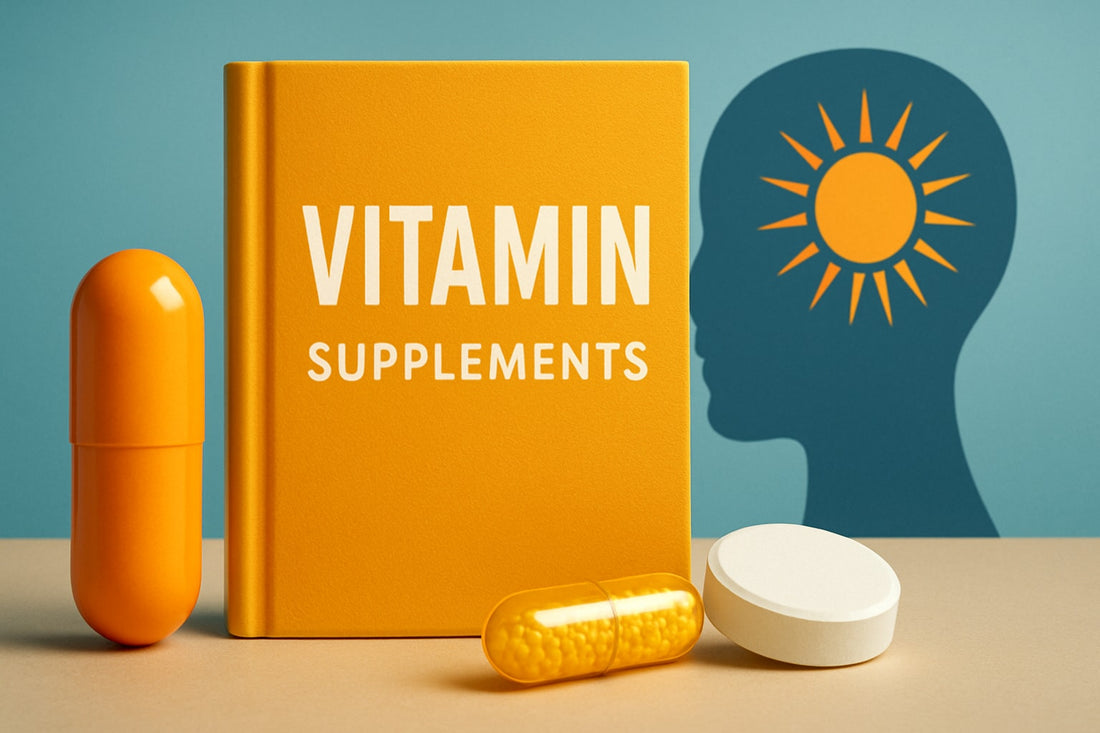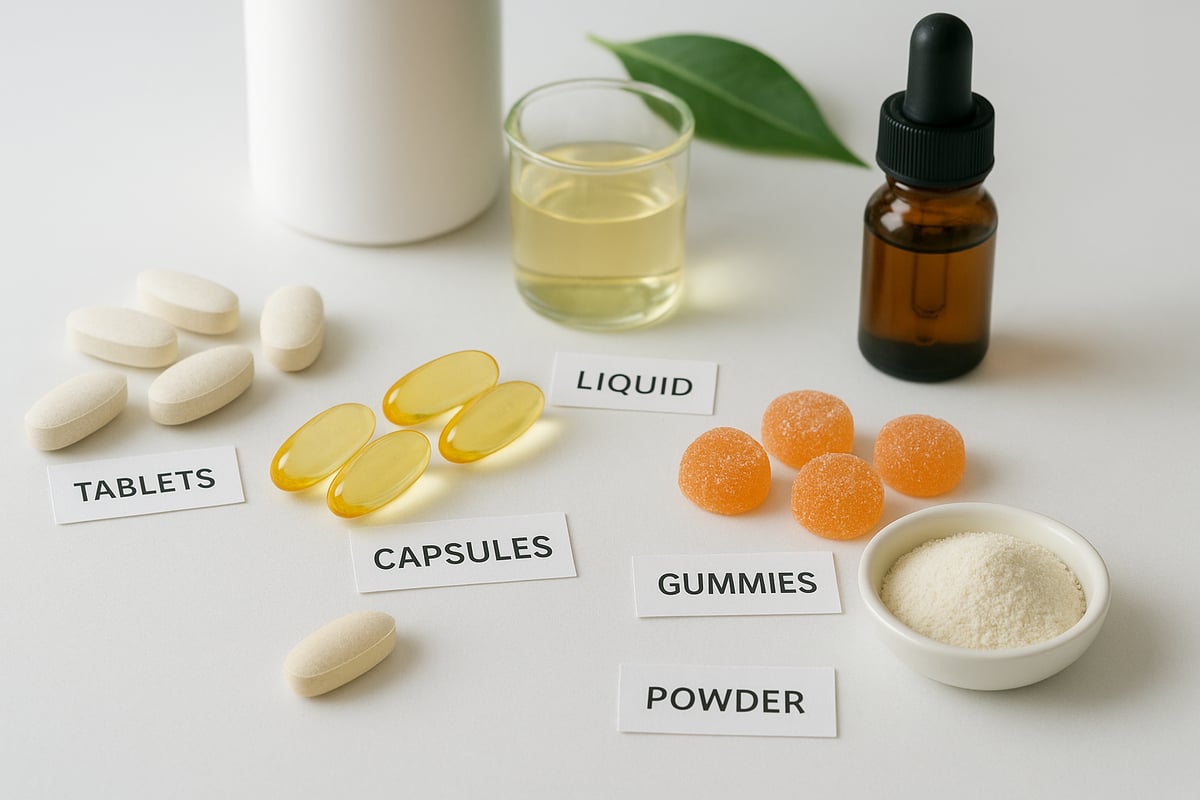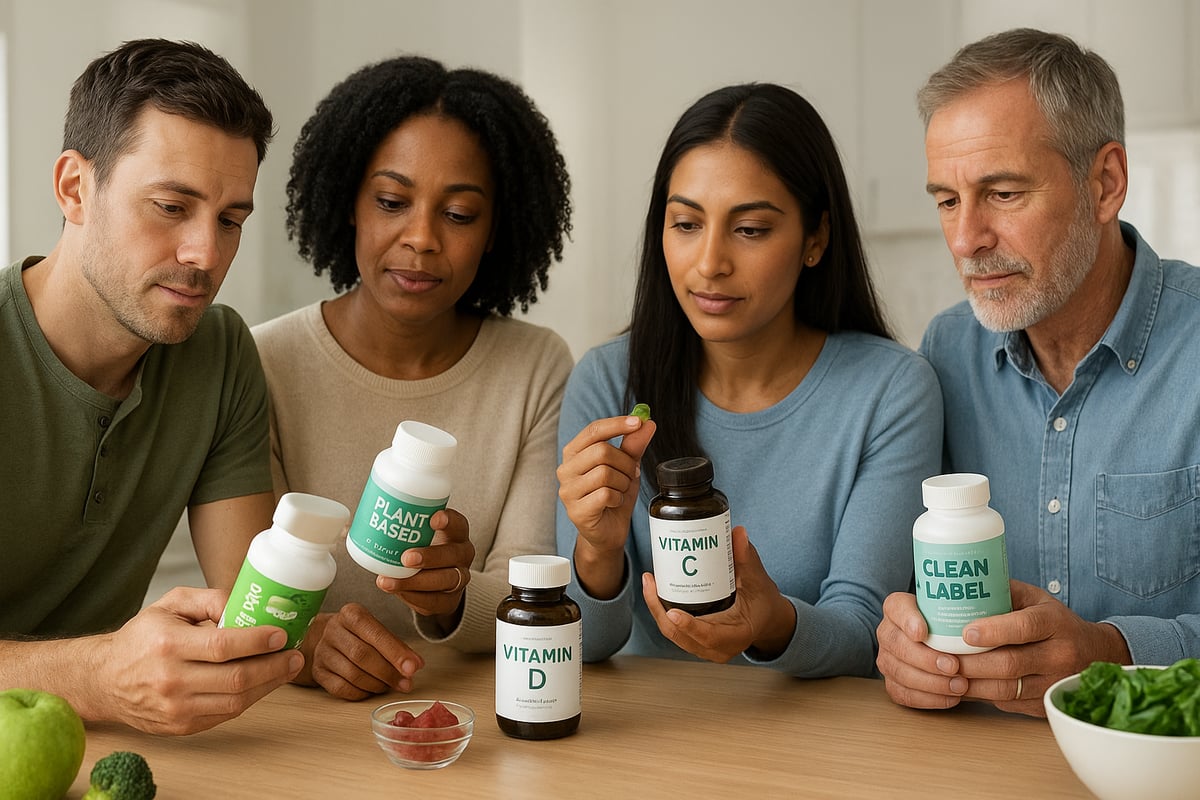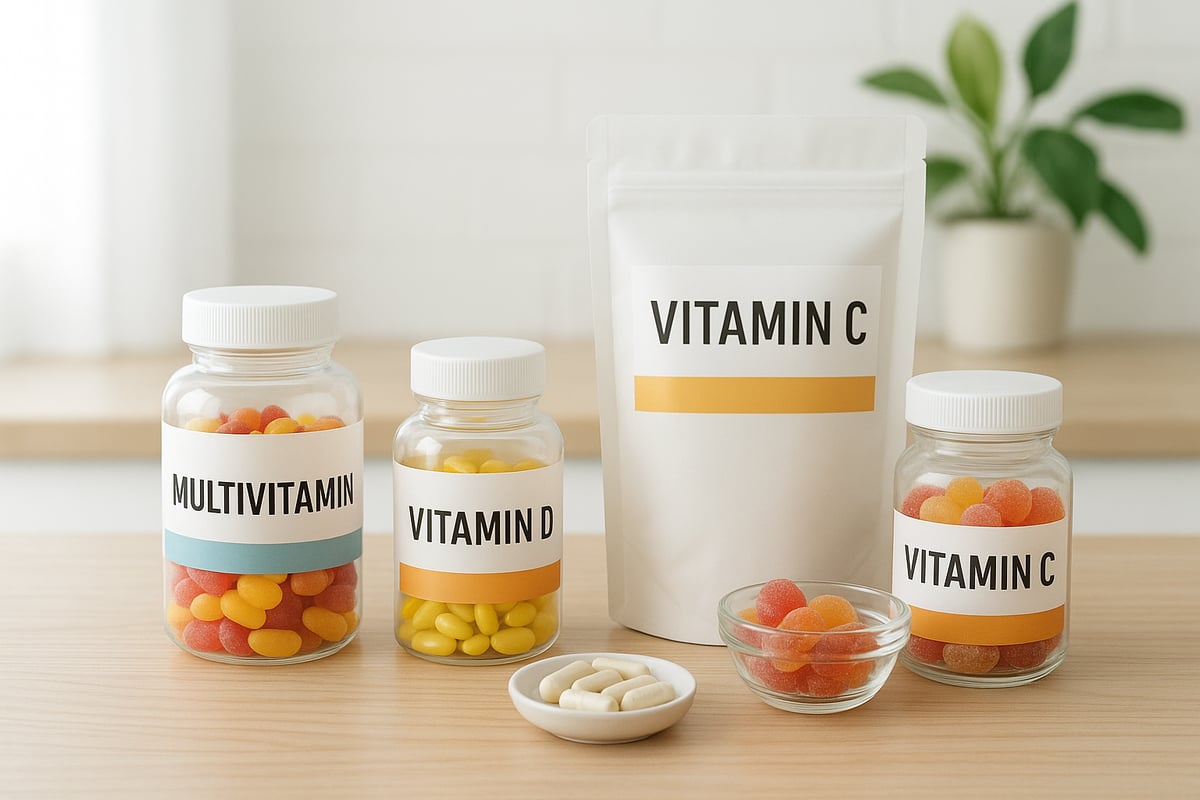
The Essential Guide to Vitamin Supplements in 2025
Share
As health trends continue to evolve and new scientific discoveries reshape what we know about nutrition, vitamin supplements have become more popular and, for many, more confusing than ever in 2025.
With so many options and conflicting information, how can you confidently choose what is best for your health? This essential guide is designed to demystify vitamin supplements, providing clear, up-to-date insights so you can make safe, effective, and personalized decisions.
We will explore the latest research, debunk common myths, guide you in selecting the right supplements, highlight this year’s innovations, and offer practical tips for seamlessly integrating vitamins into your daily routine. Get ready to move forward with clarity and confidence on your wellness journey.
The State of Vitamin Supplements in 2025
The landscape of vitamin supplements in 2025 is dynamic and rapidly evolving. Consumers are seeking clarity as new products, regulations, and trends shape the market. Understanding the state of vitamin supplements today helps you make more informed choices for your health.

Market Growth and Trends
The vitamin supplements market continues to expand globally, driven by increased health awareness, a growing aging population, and a strong post-pandemic focus on wellness. According to global vitamin supplement market growth projections, the industry is expected to reach unprecedented heights by 2025.
Personalized nutrition is gaining ground, with more consumers demanding plant-based and clean label options. Innovations in product delivery, such as gummies, liquids, and powders, make supplement routines more enjoyable and accessible. Multifunctional supplements, which combine support for immunity, beauty, and mood, have surged in popularity.
Retailers are expanding their selections to meet demand, and brands are emphasizing transparency and quality. This trend ensures that vitamin supplements are not only more available, but also better tailored to individual needs.
Regulatory Updates and Safety Standards
Recent years have brought significant changes in how vitamin supplements are regulated and labeled. Authorities now require clearer ingredient disclosures and are more vigilant about claims made on packaging. Increased scrutiny has led to a rise in third-party testing, making it easier for consumers to identify products that meet high safety and efficacy standards.
Physicians and health organizations recommend purchasing from reputable brands, as these are more likely to follow rigorous testing protocols. Data shows that supplement safety recalls have decreased as regulations have tightened, helping to rebuild consumer trust. Shoppers are encouraged to look for certifications and evidence of quality before making a purchase.
Consumer Behavior and Demographics
In 2025, vitamin supplements are most popular among adults aged 25 to 65, with women, seniors, and health-conscious individuals leading the way. Busy lifestyles and greater nutritional awareness are fueling demand across all age groups.
Online shopping has surged, with consumers valuing fast delivery and convenience from major retailers. Social media and digital health platforms play a pivotal role in influencing supplement choices, as users seek advice and reviews before buying.
Younger generations are especially drawn to personalized solutions and eco-friendly packaging. Across demographics, trust in a brand’s transparency and quality remains a top priority when selecting vitamin supplements.
Understanding Vitamin Supplement Basics
Navigating the world of vitamin supplements begins with a solid understanding of what they are, why people use them, and the risks to consider. This foundation will help you make informed choices for your health and wellness journey.

What Are Vitamin Supplements?
Vitamin supplements are concentrated sources of essential vitamins, designed to complement your diet and support overall health. These supplements differ from minerals, which provide elements like calcium or magnesium, and from herbal supplements, which use plant extracts for targeted effects.
You can find vitamin supplements in various forms, including tablets, capsules, gummies, powders, and liquids. Each form offers unique advantages in terms of convenience and absorption. For a closer look at available types and delivery methods, explore the Vitamins & Supplements Collection.
There are two main categories: synthetic and whole-food or plant-based vitamin supplements. Synthetic options are lab-created, while whole-food varieties are derived from natural food sources. Many experts suggest that whole-food or plant-based supplements may offer better absorption and are often gentler on the digestive system. Always check the label to understand the source and quality of the ingredients.
Why Take Vitamin Supplements?
People turn to vitamin supplements for a range of reasons. Some aim to fill nutritional gaps left by modern diets, while others seek to optimize health, energy, or appearance. Common motivations include:
- Addressing deficiencies in vitamins like D, B12, or iron.
- Supporting immune function, bone strength, or heart health.
- Enhancing skin, hair, or nail quality.
Data shows that nutrient deficiencies remain widespread globally and in the United States. For example, vitamin D deficiency affects a significant portion of adults, and B12 shortages are common among vegetarians and older adults. Vitamin supplements play a role in preventive healthcare and can help manage certain chronic conditions, especially when dietary intake is insufficient.
Risks and Considerations
While vitamin supplements can be beneficial, they are not without risks. Overconsumption of fat-soluble vitamins, such as A, D, E, and K, can lead to toxicity because these nutrients accumulate in the body. Interactions between supplements and prescription medications may also occur, potentially causing unwanted side effects.
It is crucial to consult your physician before starting any new vitamin supplements, particularly if you have existing health conditions or take medications. Medical guidance ensures your supplement regimen is both safe and effective, tailored to your unique needs.
Choosing the Right Vitamin Supplements for You
Selecting the right vitamin supplements is a crucial step toward optimizing your health. With countless options available, making informed decisions ensures you meet your specific nutritional needs both safely and effectively.

Assessing Your Needs
Before choosing vitamin supplements, take time to evaluate your unique requirements. Start by reviewing your typical diet, daily routine, and any health concerns. Many individuals have specific nutrient gaps based on lifestyle or dietary preferences.
Consulting a healthcare professional can help identify deficiencies. Blood tests provide concrete data, especially for nutrients like vitamin D, B12, or iron. Discussing results with your doctor ensures tailored recommendations, particularly if you are pregnant, elderly, or managing chronic conditions.
Different life stages require distinct approaches. Children benefit from formulations designed for growth and immunity. Adults may need supplements to support energy or stress management. Seniors often require extra calcium, vitamin D, and B12 for bone and cognitive health. Pregnant individuals should prioritize prenatal vitamins with folate and iron.
Reading Labels and Ingredients
Carefully reading supplement labels is vital for making the best choice. Look at the Supplement Facts panel for dosage and the percent daily value (%DV) of each nutrient. Compare ingredient sources to ensure you are getting nutrients in their most effective forms.
Watch for red flags such as:
- Fillers or unnecessary additives
- Artificial colors and flavors
- Excessive or megadose quantities
Certifications can provide peace of mind. Look for:
| Certification | What It Means |
|---|---|
| USP | Verified purity and potency |
| NSF | Independent testing for safety |
| Non-GMO | No genetically modified inputs |
| Vegan | Free from animal products |
| Allergen-Free | Safe for those with sensitivities |
Choosing products with these marks helps ensure you are selecting high-quality vitamin supplements. Always avoid supplements without clear ingredient lists or reputable certifications.
Quality, Purity, and Bioavailability
Not all vitamin supplements are created equal. High-quality products prioritize clean, simple ingredient lists and transparent sourcing. Plant-based and whole-food supplements are increasingly popular because they offer nutrients in forms your body recognizes and absorbs efficiently.
Bioavailability is a key factor. Wholefood and plant-based options tend to be gentler on digestion and more compatible with dietary restrictions. For those seeking the purest options, Plant-Based and Organic Supplements provide a comprehensive range of clean-label, allergen-free choices.
Third-party testing is essential for confirming purity and potency. Brands that disclose sourcing and testing results demonstrate a commitment to consumer safety. As you evaluate your options, prioritize transparency, ethical sourcing, and formulations that align with your health goals.
The Most Important Vitamins in 2025: What You Need to Know
Understanding which vitamin supplements matter most in 2025 is essential for optimal health. The landscape of nutrition is shifting, with certain vitamins standing out for their roles in immunity, energy, and disease prevention. Let us explore which nutrients are making the biggest impact and how they fit into your wellness plan.

Key Vitamins and Their Roles
The foundation of daily health in 2025 rests on a few essential vitamin supplements. Vitamin D remains critical for immune function and strong bones, especially as many people spend more time indoors. Vitamin B12 is vital for energy and nerve health, making it especially important for those following plant-based diets. Vitamin C supports immunity, acts as a powerful antioxidant, and promotes skin health.
Vitamin A is necessary for eye health, immune defense, and cell growth. Vitamin E offers antioxidant protection and supports the heart and skin. Vitamin K is essential for blood clotting and bone strength. Folate or folic acid is especially important during pregnancy and for overall cellular function.
Here is a quick comparison of these key vitamin supplements and their main benefits:
| Vitamin | Key Benefits | Notable Groups |
|---|---|---|
| D | Immunity, bones | All, seniors |
| B12 | Energy, nerves | Vegans, seniors |
| C | Immunity, skin, antioxidant | All ages |
| A | Vision, cell growth | Children, adults |
| E | Heart, skin, antioxidant | Adults, seniors |
| K | Clotting, bones | Seniors, pregnant women |
| Folate | Pregnancy, cells | Women, all adults |
Choosing the right vitamin supplements from this list can help address specific health needs.
Special Considerations for Different Groups
Not everyone needs the same vitamin supplements. Women often require prenatal vitamins, iron, calcium, and biotin for reproductive health and beauty support. Men may benefit from blends focused on heart and prostate health, along with energy support.
Children need supplements that encourage growth and strong immunity, such as vitamin D, vitamin C, and iron, often provided in the form of gummies for easier consumption. Seniors are at higher risk for deficiencies in vitamin D, B12, and magnesium, so targeted vitamin supplements can support bone strength, mental clarity, and energy.
For each life stage, it is wise to tailor your vitamin supplements to match your age, gender, and specific health needs. Consulting with a healthcare provider can help you make informed choices.
Statistics and Data Points
Research shows that up to 42 percent of US adults have a vitamin D deficiency, highlighting the importance of regular supplementation. Multivitamins continue to be the leading choice, as they offer a convenient way to address multiple nutrient gaps at once. According to retail data, multivitamin sales remain strong across all age groups.
Common nutrient gaps differ by age and gender, with vitamin D, B12, iron, and folate frequently lacking in many diets. For a deeper look at how multivitamins support balanced nutrition, see this guide on Achieving Balance with Multivitamins.
By understanding the data and trends, you can select vitamin supplements that match your personal needs and contribute to long-term wellness.
Innovations and Trends in Vitamin Supplements for 2025
The world of vitamin supplements is transforming quickly in 2025. Consumers are seeking more personalized, sustainable, and convenient solutions than ever before. These trends are reshaping how people select and use vitamin supplements in their daily routines.
Personalized Nutrition and Digital Health
Personalization is at the heart of innovation in vitamin supplements. DNA-based supplement recommendations are now widely available, offering tailored nutrition plans based on genetic profiles. Consumers can use apps to analyze their dietary habits and receive real-time guidance on which vitamin supplements best suit their needs.
Smart packaging, such as RFID-enabled bottles, helps users remember daily doses and track usage. Subscription models deliver monthly refills directly to homes, supporting consistency. Integration with wearable health technology, like fitness trackers, allows for seamless monitoring of nutrient intake and health outcomes. This synergy of technology and nutrition ensures that vitamin supplements are more relevant and effective for every individual.
Sustainable and Ethical Supplementation
Sustainability is a driving force in the 2025 vitamin supplements market. There is a significant rise in vegan and plant-based products, as consumers seek clean-label options that align with their ethical values. Brands are prioritizing eco-friendly packaging, including compostable bottles and recycled materials, to reduce environmental impact.
Transparency is also key. Companies now provide detailed supply chain information, ensuring that ingredients are sourced responsibly. Biodegradable packaging and a focus on minimal waste appeal to environmentally conscious buyers. For a deeper look at these changes, Emerging trends in dietary supplements for 2025 provides insight into how brands are adapting to consumer demand for sustainable and ethical vitamin supplements.
New Delivery Systems and Product Formats
The delivery methods for vitamin supplements have expanded far beyond traditional pills. Gummies, powders, and liquids are now mainstream, offering easier consumption and improved absorption. Consumers appreciate the variety of flavors and textures, making daily supplementation more enjoyable.
Innovative products combine multiple benefits, such as immunity and beauty support in a single dose. Companies focus on bioavailability, ensuring nutrients are efficiently absorbed by the body. Smart packaging and single-serve sachets add convenience for busy lifestyles. These developments make vitamin supplements more accessible and appealing across all demographics, reflecting the evolving needs and preferences of modern consumers.
How to Safely Integrate Vitamin Supplements Into Your Daily Routine
Integrating vitamin supplements into your daily routine can significantly support your health goals, but safety and consistency are vital. With the variety of products available, it is essential to approach supplementation with a clear plan and professional guidance. By following best practices, you can maximize the benefits of vitamin supplements while minimizing risks.
Best Practices for Supplement Use
Establishing a consistent schedule is the cornerstone of effective vitamin supplements use. Taking your vitamins at the same time each day helps build a habit and ensures you do not miss doses. Many people find it useful to pair supplements with a daily meal, which can also enhance absorption, especially for fat-soluble vitamins like A, D, E, and K.
To optimize benefits, consider these strategies:
- Use a pill organizer or set reminders on your phone.
- Pair vitamin supplements with breakfast or another routine meal.
- Track your intake in a health journal or app to avoid doubling up.
Be mindful of the form your supplements take. Gummies, capsules, and liquids each have unique absorption rates and convenience factors. For immune support, consider reviewing the Top 5 Supplements for Immunity to identify practical options for your daily routine.
Consulting Healthcare Professionals
Before starting any vitamin supplements, consult with your doctor or pharmacist. This is particularly important if you have chronic conditions, are pregnant, or are taking prescription medications. A healthcare professional can help you determine which supplements are appropriate, review potential interactions, and recommend safe dosages.
Seek advice if you experience:
- New or worsening symptoms after starting supplements
- Changes in your health status or medication regimen
- Life stage transitions, such as pregnancy or aging
Open communication with your healthcare team ensures your vitamin supplements support your overall health and do not interfere with other treatments.
Monitoring Your Health and Adjusting as Needed
Regularly monitoring your health is essential when using vitamin supplements. Watch for signs of improvement, such as increased energy, better mood, or stronger immunity. Conversely, be alert for adverse effects like digestive upset or allergic reactions.
Tools for monitoring include:
- Periodic bloodwork to assess nutrient levels
- At-home tests for certain vitamins
- Keeping a symptom diary
As your health needs evolve, be ready to adjust your vitamin supplements regimen. Consult your healthcare provider before making significant changes to ensure continued safety and effectiveness.
Frequently Asked Questions About Vitamin Supplements in 2025
Navigating vitamin supplements in 2025 can be challenging, with evolving research and an abundance of options. Below, we answer the most common questions to help you make informed choices.
Are vitamin supplements really necessary if I eat a balanced diet?
A balanced diet is ideal, but research shows many people still have nutrient gaps. Factors like age, lifestyle, and dietary restrictions can make vitamin supplements beneficial for meeting daily needs.
How do I know if a supplement is working?
You may notice improvements in energy, immunity, or overall wellbeing. For some nutrients, blood tests can confirm effectiveness, especially for vitamins like D and B12.
Can I take too many supplements at once?
Yes, excessive intake of certain vitamins can be harmful. Always follow recommended dosages and consult your healthcare provider to avoid interactions or toxicity.
What’s the difference between synthetic and natural vitamins?
Synthetic vitamins are made in labs, while natural vitamins are derived from whole foods. Some studies suggest plant-based supplements may offer better absorption and fewer side effects.
Are gummy vitamins as effective as pills or capsules?
Gummy vitamins can be effective, but they sometimes contain lower doses and added sugars. Check the label to ensure you get the nutrients you need.
How do I choose supplements for my specific health goals?
Start by identifying your needs—age, health status, and personal goals. Consulting a professional and reviewing global supplement trends and consumer behavior can help tailor your choice.
What should I do if I experience side effects from a supplement?
Stop taking the supplement and consult your doctor. Side effects may indicate an allergy, interaction, or overdose.
As you navigate the evolving world of vitamin supplements in 2025, remember that clarity and quality matter more than ever. With so many options out there, choosing plant-based, whole-food supplements can simplify your routine and support your health goals—naturally and effectively. At Essential Life, we believe your body deserves supplements that are clean, gentle, and truly nourishing, free from unnecessary additives. If you’re ready to take the next step toward balanced, everyday wellness, consider making your choices cleaner and smarter.
Your body deserves better choose clean supplements that work
